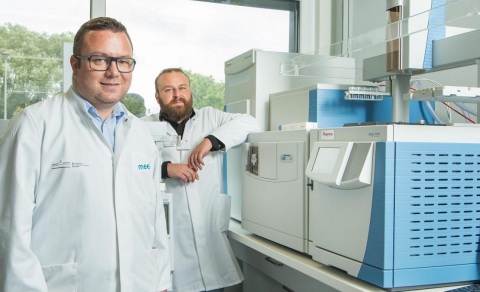First customer installation of breakthrough Thermo Scientific Q Exactive GC-MS combining gas chromatography and high-resolution accurate-mass (HRAM) Orbitrap mass spectrometry
SAN JOSE, Calif. — (BUSINESS WIRE) — October 19, 2015 — The first installation of a new Orbitrap-based GC-MS/MS instrument, designed to bring the highest levels of detection and identification capabilities to GC-MS studies, has taken place at the Muenster Electrochemical Energy Technology (MEET) Battery Research Center, University of Muenster, Germany.
This Smart News Release features multimedia. View the full release here: http://www.businesswire.com/news/home/20151019005788/en/

University of Muenster Using Obitrap-based GC-MS to Advance Lithium-Ion Battery Research. Left to right: Morten Bern, Thermo Fisher Scientific; Dr. Sascha Nowak, the MEET Centre, University of Muenster. (Photo: Business Wire)
Under the direction of Prof. Dr. Martin Winter, MEET focuses on the research and development of innovative electrochemical energy storage devices with high-energy density, longer durability and maximum safety. Dr. Sascha Nowak, Head of Division, Analytics and Environmental Aspects at MEET, will be the first to use the new Thermo Scientific Q Exactive GC hybrid quadrupole-Orbitrap GC-MS/MS instrument for his lab, with the aim to improve his team’s work on lithium-ion batteries.
“Our research is primarily in the use of lithium-ion batteries for the automotive sector. Our team had been analyzing potential toxic compounds using GC analysis, but had reached the limits with our existing technology in terms of resolution and limits of detection,” said Dr. Nowak. “After learning about the Q Exactive GC system, it offers high resolving power and mass accuracy, with better limits of detection required to gain a quantitative measure of toxicity. We know the outstanding level of performance that we’ve come to rely on from Thermo Scientific instruments will continue to help us further our work in battery research.”
According to Dr. Nowak’s research, the increasing number of components in a lithium-ion battery makes it essential to use a variety of analytical methods to attain complete characterization, including tests on aged cells. The focus is the analysis of the electrolyte – the identification and explanation of aging phenomena caused by both thermal and electrochemical factors. As lithium-ion battery electrolytes age, their effectiveness and performance decreases and they release different decomposition products like organophosphates, which are a key indicator of battery performance as well as toxicity. To complete a quantitative toxicity assessment, a lab needs to accurately detect and differentiate between fluorinated and non-fluorinated phosphates, which are extremely small molecules of similar mass.
“The important research being conducted by MEET is a perfect application for our inaugural installation of the new Q Exactive GC instrument,” said Morten Bern, senior director and general manager, gas chromatography mass spectrometry for Thermo Fisher. “Using HRAM will enable Dr. Nowak’s lab to gain an even deeper understanding of their samples.”
Representing the first-ever commercial system to provide a combination of GC and HRAM Orbitrap mass spectrometry, this easy-to-use system is designed to provide the most comprehensive characterization of samples in a single analysis for increased performance in compound discovery, identification, and quantitation. The HRAM Orbitrap mass spectrometry technology is designed to advance chemical analyses within laboratories limited by currently available full scan GC-MS technologies, such as time-of-flight (TOF) and quadrupole-time-of-flight (Q-TOF) MS, or comparable technologies. The new Q Exactive GC system is suitable for untargeted profiling experiments and can add new capabilities to a broad array of applications from screening in food safety to forensic toxicology and anti-doping.
More information on the MEET Battery Research Centre, University of Muenster can be found at www.uni-muenster.de/MEET.
More information on the Q Exactive GC system can be found by visiting www.thermoscientific.com/QExactiveGC.
About Thermo Fisher Scientific
Thermo Fisher Scientific Inc. is the world leader in serving science, with revenues of $17 billion and approximately 50,000 employees in 50 countries. Our mission is to enable our customers to make the world healthier, cleaner and safer. We help our customers accelerate life sciences research, solve complex analytical challenges, improve patient diagnostics and increase laboratory productivity. Through our premier brands – Thermo Scientific, Applied Biosystems, Invitrogen, Fisher Scientific and Unity Lab Services – we offer an unmatched combination of innovative technologies, purchasing convenience and comprehensive support. For more information, please visit www.thermofisher.com.
View source version on businesswire.com: http://www.businesswire.com/news/home/20151019005788/en/
Contact:
Thermo Fisher Scientific
Marcia Goff, +1 508-902-7041
Email Contact
or
Chempetitive/BioStrata
Carolyn
Butchers,+ 44 (0) 1223 828200
Email Contact

